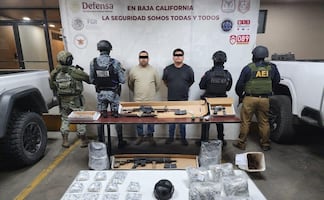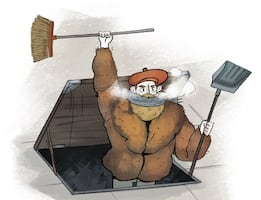Sean Penn says his article on Mexican drug lord Joaquín "El Chapo" Guzmán "failed" in its mission.
Speaking to CBS' "60 Minutes," the actor said his intention in tracking down the escaped drug kingpin and writing about him for "Rolling Stone" was to kick-start a discussion of the U.S. government's policy on the War on Drugs.
But the public's attention has instead been focused on the fact that Penn found and met with Guzmán for seven hours in a mountain hideout last October while he was still evading Mexican officials. He was apprehended only last week after six months on the run.
Excerpts from the interview with Penn were released Friday. The interview airs on "60 Minutes" Sunday.
Penn has been drawn into a controversy over whether he may have assisted in the recapture effort, or, conversely, may have prolonged the search by keeping silent until the article was published last week.
Penn said the Mexican government was "clearly very humiliated" but insisted he had played no role in Guzmán's eventual recapture.
"We had met with him many weeks earlier," he says. "On October 2nd, in a place nowhere near where he was captured."
Guzmán's reason for agreeing to meet with the Hollywood star was first explained as resulting from his interest in having a movie made about him. Then it seemed his interest was in a face-to-face encounter not with Penn, but with the contact who was bringing them together: Mexican actress Kate del Castillo, with whom Guzmán openly flirted in recently published text messages.
For his part, Penn said he had only one true mission.
Guzmán, he said, was someone through whom "I could begin a conversation about the policy of the war on drugs. That was my simple idea."
The Rolling Stone article set off a bombshell, including criticism over the magazine's willingness to give Guzmán approval of the article before it was published.
There was also suspicion about Penn's qualifications as a Hollywood star, not an established journalist, to report such a big story.
"When you get the story that every journalist in the world wanted, there's a lot of green-eyed monsters who gonna come give you a kiss," said Penn, who believes Guzmán gave him access because he's not a professional journalist.
In an email exchange with the Associated Press Monday about his meeting with Guzmán, Penn said, "I've got nothin' to hide." But he told "60 Minutes" he has "a terrible regret."
"I have a regret that the entire discussion about this article ignores its purpose, which was to try to contribute to this discussion about the policy in the War on Drugs," Penn said.
"Let's go to the big picture of what we all want: We all want this drug problem to stop," he said, but added that the market for these illicit drugs includes many Americans. "There is a complicity there."
But what percentage of the discussion that resulted from the article has been focused on these larger issues?
"One percent - I think that'd be generous," Penn said. "Let me be clear. My article failed."
Noticias según tus intereses
[Publicidad]
[Publicidad]














